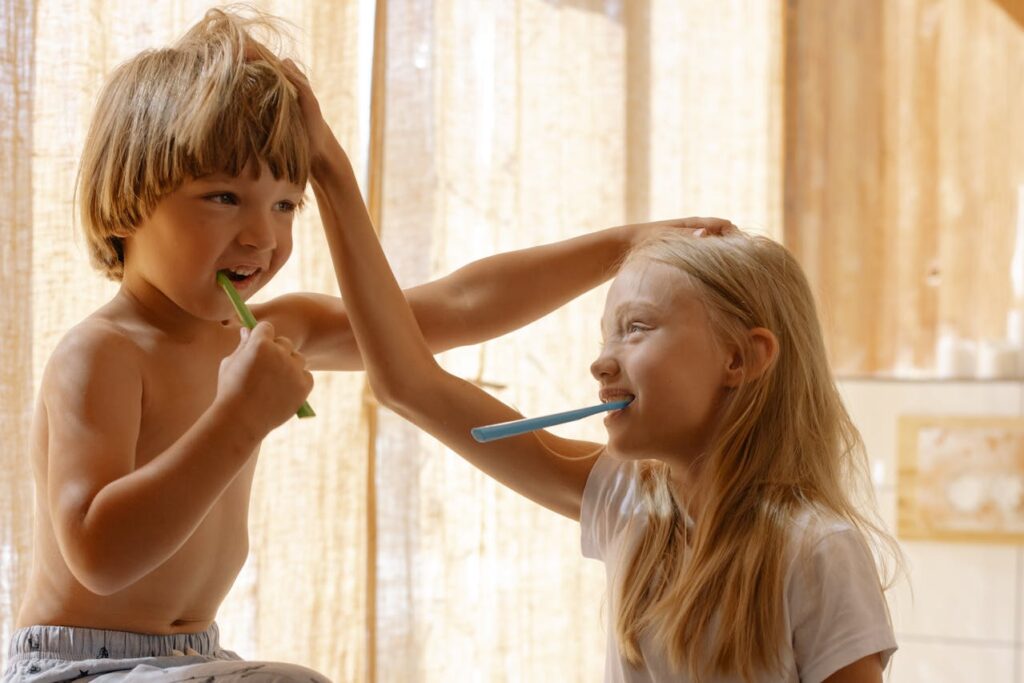Most parents don’t realize how important their morning routine really is. The long term effects of a morning routine for kids is truly impressive. Something as simple as having breakfast together every day can boost your child’s long-term emotional health, mental focus, academic performance, and sense of stability. A structured morning routine, whether simple or complex, instills deeply rooted skills and capabilities in your children that will help them for the rest of their lives.
A study by the State University at Albany revealed that college students who report a regular morning routine were more likely to be well-balanced, manage their time effectively, focus on tasks, and showed overall better academic performance than students whose families did not have daily routines throughout childhood. Routines are a powerful tool for parenting, and they do more good than you can imagine.
While you may just be trying to get everyone fed and out the door on time, your children are learning valuable lessons about stability, time, nutrition, independence, and how to build routines for themselves in the future.
In this article, we’ll explore five key reasons why a morning routine for kids is essential and provide practical tips on how to start one.
Understanding the Importance of a Morning Routine for Kids
A well-structured morning routine plays an important role in your children’s emotional and cognitive development. A stable routine provides a sense of predictable safety, allowing children to feel more confident about each day and giving them the ability to take control and manage the routine themselves as they get older.
Younger kids benefit from being guided after they wake up, through the morning routine, and rewarded with positive reinforcement for taking part. Older kids may benefit from having a role in the routine, from checking their own bag to choosing breakfast options, or even helping with breakfast or taking care of younger siblings.
Doing the same thing each morning provides a framework that young children children learn from, something familiar to rely on, and the tools to build their own routines in the future.
Benefits of a Morning Routine for Kids
There are a wide range of benefits that come from an established morning routine for kids. Building the routine can positively impact children’s day-to-day lives, make transitions easier, and provide long-term advantages that carry into adulthood. Not to mention, a good routine can help you enjoy a stress-free morning even if you or your kids are not ‘morning people’ and feel like you don’t have enough time.
Let’s take a closer look at the most significant advantages of a morning routine:
1. Establishing a Consistent Morning Routine Builds Good Habits
Children benefit from learning good habits and lifestyle choices as part of a routine. Morning routines for kids normalize good decisions like waking up on time, eating a healthy breakfast, stretching in the sunshine, and completing a checklist to ensure they’re ready for school. Some parents build this type of routine automatically – often extending the routine they themselves experienced as children. Other parents intentionally build this daily structure that benefits the whole family.
Studies have shown that routines are essential to forming habits. Kids who learn a healthy morning routine are likely to continue those good habits for their entire lives. This is also true for an evening routine.
2. A Morning Routine Enhances Emotional Well-Being
Kids benefit from structure and reliability. Knowing how the morning will go can reduce stress and anxiety. The simple existence of a morning routine for kids provides benefits to stress and sleep quality. Routines can also easily be used to reinforce healthy eating and daily physical activity. Many psychological studies have found that routines support emotional health, while family studies revealed that a consistent morning routine results in children who are more resilient to other major changes and challenges.

Credit: Pexels
3. Improved Focus and Academic Performance
Morning routines during the school year can help children develop better focus, perseverance, and academic performance. While the connection is not always obvious, just sharing breakfast and checking backpacks every school morning can have a positive short-term benefit and a profound long-term impact on your child’s academic success. The daily routine for kids instills a personal stability that also translates into valuable traits in their future careers, as well.
In the previously mentioned study of college students, it was revealed that students who had a consistent morning routine throughout childhood were more likely to have better focus and academic performance. So when getting ready for “back to school” consider the long-term value of your morning routine.
4. Fostering Independence and Self-Reliance
Children who master their morning routine become more self-reliant. Morning routines for kids become familiar. At first, a routine is something that you walk a child through. But as the routine becomes familiar, children gain the ability to navigate it themselves. Eventually, older kids will be ready to contribute to the routine and help make it happen.
This is supported by decades of child development studies. Children benefit from age-appropriate tasks and routines which they master and make their own. You may soon find your kids setting their own alarm clock, helping with breakfast, checking their own school bag, and reminding you of essential parts of the routine if you miss something. Some kids even get up early for extra time to play before your routine begins. This is a sign that their independence and self-reliance is growing.
5. Creating a Smooth Transition From Home to School
Lastly, routines help your kids smoothly transition between home and school. Morning routines for kids help them get into the school-ready mindset. An after-school routine can help them finish homework and slip back into ‘family time’ the same way you benefit from a routine when you get home from work. A daily routine chart for kids can really help your kids complete beneficial morning, afternoon, and bedtime routines.
That transition between home life and school days can be essential to getting everything done, developing good habits, and learning to transition between other aspects of life.
👉 Want to discover how to instill responsibility in your child? Read our article, “The Power of Chores for Kids: Building Responsibility, Confidence & Independence,” and uncover effective strategies to boost your child’s sense of responsibility and confidence through everyday tasks.

Credit: Pexels
How To Start a Morning Routine for Kids
If you don’t already have a morning routine, it’s never too late or too early to start. Morning routines are something shared by the family that help everyone get moving for the day. It can be challenging if your child is sleepy or moody in the morning, but the routine itself can help you get through these challenges.
When building your morning routine, make sure your child (and you!) get a good night’s sleep, then plan a routine that involves the whole family. If your child doesn’t get enough sleep, it will be really difficult to stick to wake-up time and maintain good habits. Little ones adapt best to a morning routine that is shared by everyone in the house. Let’s dive into the four-step process of building a healthy morning routine for kids.
Step 1: Identify Key Activities for a Successful Morning Routine
Start by identifying the activities that should be part of your morning routine. Make a list of everything that needs to be done in the morning and also for the rest of the day. This might include:
- Waking up on time;
- Getting dressed;
- Brushing teeth;
- Morning stretches;
- Cooking / Eating a healthy breakfast;
- Morning conversation;
- School bag packing;
- Packing lunches;
- “Flight Check” before departure.
Making all of these elements of a morning routine for kids can help them get done automatically once the routine becomes a habit. This not only means your kids always get the most important meal of the day and leave with their bags packed, but it also means fewer battles in the morning to get it all done.
Step 2: Create a Morning Routine Checklist for Kids
Turn your routine into a checklist and post that list on the fridge. A morning routine checklist can help your children understand what needs to be done and start completing tasks on their own. For younger children, make it a printable sticker chart with rewards for completed mornings as you establish and reinforce the routine. Even older children might enjoy checking off boxes with a dry-erase marker and high-fiving as you complete the routine together.
A checklist or routine chart for kids can also help your children adapt when a new routine is necessary. You might make different lists for school days vs week days, or school year vs summer, or a new checklist each time your children’s school schedules change. But always keep a few core elements and tasks in order so the routine feels as stable as possible.
Step 3: Involve Your Child in the Routine Planning Process
Get your children to become part of the routine. The best morning routines for kids aren’t enforced, they are a team effort. You want your children to own their routine, to master the tasks and feel proud of the part they play in making the routine go smoothly.
When building a new routine, get your kids involved in the planning process. Explain your goals and ask them what they think should be in the routine, and what order things should go in. Build it step-by-step. Let them start with the obvious (e.g., brushing teeth after waking up and morning snuggles). Then give your children choices.
- What kind of breakfast should you have, and should the breakfast change or be the same every day?
- Will you have a morning stretch together?
- Will you allow screen time (half-hour of cartoons) if your kids get up a half-hour early?
- What about pet care and a morning dog walk?
- Can siblings help each other?
- Is playtime allowed?
Discuss, bargain, and make the routine feel like something your children feel like they own. This not only helps with routine buy-in, it also instills that sense of self-reliance and personal habit-building that are at the core of a routine’s long-term benefits for children.
Step 4: Establish Consistency and Be Flexible
Make sure your morning routine for kids is something they can rely on. Be consistent. Get up at the same time every day, make the same breakfast or offer the same choices each day. Try not to skip steps, the more consistent, the better. But at the same time, be ready to adapt and show flexibility, as last-minute changes can sometimes occur.
Children love a routine they can count on and master, but it’s also important to flex with life changes. Your kids may have a new bus schedule as they enter middle school. Your work schedule might change. Your child might develop a new favorite breakfast food or refuse an old favorite. One child might incorporate morning exercise or have early morning sports practice. Another might need their homework checked in the morning on a tough subject.
Life changes, and so can your routine. You can provide the best possible example for how to maintain consistency and adaptability at the same time. When the routine changes, talk about how you will adapt. Explain your new choices or make the decisions together.
- “Bobby has track practice in the morning now, so we’ll have breakfast and bag-check a little earlier this year.”
- “Since you’re learning to cook, do you want to help me with breakfast from now on?”
- “The bus comes a little later this year, so you can sleep an extra half-hour or you can have an extra half-hour to play after breakfast.”
- “Arianna has a big project this month, so she can get up early to work on it, and we’ll clean up the table before breakfast.”

Credit: Pexels
Embracing Your Morning Routine with the Kids
A morning routine is a wonderful thing for a family to share. In many studies on routines, mental health, child development, and student outcomes, it has been revealed that a good morning routine for kids provides both short-term and life-long benefits. Your children will benefit from the stability, from tasks they learn to master, and practice implementing their own beneficial routines later in life.
In fact, your kids aren’t the only ones who will benefit. Adults benefit from a good morning routine almost as much. You, too, will be building good habits, eating a healthy breakfast while drinking a cup of coffee, and completing your morning checklist each day. You’ll feel more collected, ready to make the home-to-work mental transition, and probably check your bag before leaving the house more often. Not to mention the warm fuzzies when your kids start enacting the routine on their own.
Whether you have a routine to improve or you’re introducing the morning routine for the first time, building a morning routine for kids is beneficial for everyone involved.
Are you willing to make over your family’s life and create persistent routines? Enroll for one of our Parenting Masterclasses now and have exclusive access to specialized advice on how to set up powerful routines and keep family peaceful. Gain knowledge from top parenting experts in the world and learn strategies that will help you facilitate your child’s growth while promoting a home environment filled with serenity. Plus, get 24/7 support from Sophie, our AI parenting expert, who can provide answers to all your parenting-related questions, any hour of the day.
References
Arlinghaus, K. R., & Johnston, C. A. (2018, December 29). The importance of creating habits and routine. American journal of lifestyle medicine. https://www.ncbi.nlm.nih.gov/pmc/articles/PMC6378489/
Myers, R., & Myers, A. T. A. R. (2023, August 30). Let them shine! promoting independence through age-appropriate tasks and routines. Child Development Institute. https://childdevelopmentinfo.com/positive-parenting/let-them-shine-promoting-independence-through-age-appropriate-tasks-and-routines/
Study: Daily routines impact childhood development. University at Albany – State University of New York. (n.d.). https://www.albany.edu/news/75004.php









